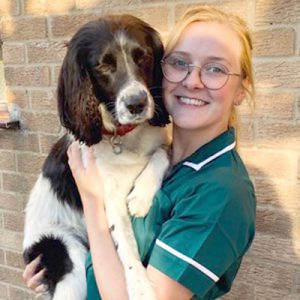
After experiencing glimpses of what being a veterinary nurse was all about when I worked as a veterinary receptionist, I applied and was accepted as a student veterinary nurse with the Central College of Animal Studies (CCOAS).
I was only six months into the Diploma of Small Animal Veterinary Nursing when the coronavirus pandemic hit and the Government advised us all to stay at home. In-person learning was halted and we were switched to remote, online methods to keep us safe whilst continuing to study. For many, lockdown also resulted in placements being stopped, reducing practical learning and slowing down the progression of the Central Skills Log (CSL), the practical log used to track our training.
Throughout this time, CCOAS enabled us to continue to study virtually via Zoom. This meant our lessons could continue regularly and kept us as close to face-to-face teaching as possible.
All of the lesson resources, articles and additional revision tools were sent out to us in advance to ensure we had the correct materials for the lessons. It meant that even without in-person learning, we were still provided with the same resources we would have had in the classroom. We had constant access to PowerPoints, worksheets and extra revision materials, allowing us to continue to work towards our qualification, and catch up using the required resources when needed.
Using Zoom, we could still study together as a group and continue classroom discussions, keeping our learning as effective as possible and allowing us to communicate openly. Prior to the coronavirus lockdown, we would reflect on our working weeks in our college sessions. Using Zoom allowed us to continue to share our experiences and discuss cases we found interesting or difficult to deal with, which was even more important given the tough lockdown circumstances.
Our lecturers and the CCOAS support staff were always there to provide assistance via email. The use of Zoom meant it was possible to have additional one-on-one sessions, if required, to consolidate our learning and provide support or catch-up sessions when needed. These were always facilitated and no question or concern was ever too silly.
Prior to the coronavirus lockdown, as a training veterinary nurse I had the opportunity to complete my weekly placements within two branches of my Suffolk veterinary practice. This had opened my eyes to a wide caseload.
However, when coronavirus hit, it was decided we would remain at an individual practice to help reduce the risk to staff and so I stayed at one site. At the same time, the practices legally had to reduce their workload down to essential and emergency cases only. Alongside the introduction of remote prescribing and online consultations, it meant that face-to-face appointments were almost non-existent and the cases coming through the practice dramatically decreased, having a direct affect on my CSL progress.
However, I was one of the lucky ones - multiple students across the country were furloughed and their CSL progress remained dormant for weeks on end. Some even lost placements when everything began to open up again. Given the difficult circumstances, I was lucky to have the opportunity to stay in practice and remain training. I continued to slowly gather CSL evidence and grow as a veterinary nurse.
Coronavirus took away so much, but also allowed me to gain so much too. The cases I saw were often critical or required more specialised nursing, which contributed to my development. A high number of staff were furloughed throughout my practice, including clinical coaches. However, CCOAS provided me with support throughout this and still allowed me to progress, meaning my CSL could continue to be completed.
The pandemic itself, and the circumstances it created, presented a huge obstacle to CCOAS and to the associated training practices. Coronavirus was capable of making it much more difficult to achieve our qualifications on time. But due to the set-up created, and the support provided to us, our cohort were able to overcome the problems that arose. We continued to study through such a tricky period to go on to achieve the qualification we worked so hard for.
